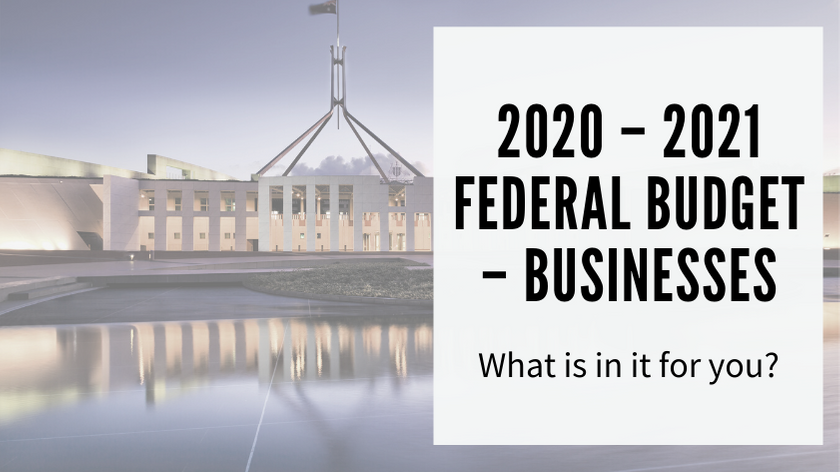While the Government has invested a significant amount of money through JobKeeper to encourage and assist businesses to maintain its workforce and keep people employed, this Budget was a little disappointing for businesses.
The budget was a greater disappointment for small businesses than perhaps for medium to large business as they will most likely gain more benefits from the immediate asset write off and the temporary loss carry back provisions.
Thinking about the sectors that have been hardest hit by COVID-19 we think of tourism and hospitality. The abolition of Fringe Benefits Tax (FBT) was an opportunity forgone. The abolition of FBT would have encouraged businesses to be able to:
- spend money entertaining clients and staff at restaurants, pubs, clubs, sporting/entertainment events.
- spend money on sending employees to conferences within Australia whether they be interstate or regional areas as this would have supported airlines, hotels, conference centres, local businesses such as cafes and restaurants.
- provide non-cash rewards for employees such as air travel, hotel accommodations, restaurant vouchers etc.
Based on the Government’s expected revenues for 2020/21, Fringe Benefits Tax accounts only 0.825% of the forecast revenue. Given that other parts of the Budget are trying to encourage businesses to spend on depreciable assets, why would we not encourage businesses support tourism and hospitality which employs a significant percentage of the workforce. The abolition of FBT would have been of greater assistance to small businesses across Australia. It would be interesting to see financial modelling of the costs and benefits of abolishing FBT.
Rather than continuing to focus on what the missed opportunity was, lets now focus on what the Budget is offering businesses.
Immediate write off of depreciable assets
On 12 March this year, the Government offered businesses the ability to an immediate write off of the cost depreciable assets acquired and installed ready for use between 12 March and 31 December 2020.
The budget has taken this measure much further in an effort to encourage businesses to invest in their future. The Government announced that businesses with a turnover of below $5.0b will now be able to fully expense any depreciable asset acquired after 7.30pm on 6 October and first used or installed ready for use by 30 June 2020.
The cost of improvements to existing eligible depreciable assets made during this period can also be fully expensed.
Importantly for small businesses (i.e. a business with an aggregated annual turnover of less than $10.0m) they will be able to claim a tax deduction for their simplified depreciation pool at the end of the income year while the full expensing of depreciable assets applies. Further, the restriction preventing small businesses from re-entering the simplified depreciation regime for 5 years if they opt out will continue to be suspended for the time being.
Temporary loss carry back
In an attempt to assist business cash flow in the current COVID-19 environment the Government has re-introduced loss carry back rules.
Under the loss carry back rules it is proposed that companies with turnover up to $5.0b will be able to apply tax losses incurred in the 2019/20, 2020/21 and/or the 2021/22 tax years to offset tax paid in the 2018/19 or later tax years.
The tax refund will be available for eligible businesses when they lodge their 2020/21 and 2021/22 income tax returns.
The tax refund will be limited by requiring that the amount carried back is not more than the earlier taxed profits and that the carry back does not generate a franking account deficit for the company.
JobMaker Hiring Credit
A business that hires a worker between the ages of 16 and 35 years during the 12 months commencing 7th October will be eligible for either a $200 credit per week or a $100 credit per week provided that the new employee was receiving JobSeeker Payments, Youth Allowance (other) or Parenting Payment for at least 1 month of the previous 3 months when employed.
The $200 credit per week will be payable where the new employee is aged between 16 and 29 years of age. Where the new employee is aged between 30 and 35 years of age the employer will be entitled to receive a weekly credit of $100 for up to 12 months.
The disappointing thing with the JobMaker Hiring Credits is that it is forgetting about supporting those completing university or the like where they have worked and studied hard and saved the Government money by not being on JobSeeker, Youth Allowance or in receipt of Parenting Payments. We should be encouraging businesses to employ young people irrespective of whether they were receiving some form of Government assistance or not. Again, I think the Government has narrowed the focus unnecessarily.
Taxability of the Victorian Government COVID-19 Business Support Grants
As previously announced by the Government the Victorian Business Support grants for small and medium businesses will not be taxable. They have been determined to be non-assessable, non-exempt income. This means that they are not included in your business income tax return. Importantly, this only applies to grants announced on or after 13 September and for payments made between 13 September and 30 June 2021.
Fringe Benefits Tax
As mentioned in our introduction the Government missed a golden opportunity to make this Budget about rebuilding small businesses by not abolishing FBT. The exemption that has been introduced again is not really about small businesses but more focussed on medium to large businesses who have the financial resources to retrain or reskill employees that are redundant or soon to be redundant.
Currently if an employer provides training to a redundant or soon to be redundant employee and the training does not have a sufficient nexus or connection to the employee’s current employment then the cost of the retraining or reskilling is subject to FBT. By making such reskilling and retraining programs exempt from FBT it is hoped that more employers will support the reskilling and retraining of redundant employees.
The Government also announced that it would give the Commissioner of Taxation the power to allow employers to rely on existing corporate records rather than employee declarations and the like to finalise their FBT returns. It sounds positive but the problem is that businesses are at the mercy of the Commissioner of Taxation and his/her officers to determine whether our records are sufficient. If anything, it creates uncertainty rather than reducing red tape. It will simply make it easier for the Commissioner to turn around and say your records are inadequate and hit you with an amended assessment for your FBT return. How is giving the Commissioner a discretion to determine what is and is not adequate record keeping going to save on record keeping?
Research & Development Tax Incentive
For small companies (i.e. with an aggregated turnover of less than $20.0m) the refundable R&D tax offset will be set at 18.5% above the company’s tax rate and the cap on the annual cash refund of $4.0m will be scrapped.
For large companies (i.e. an aggregated turnover of $20.0m or more) the number of intensity tiers will reduce from 3 to 2. The R&D premium ties the rate on the non-refundable R&D tax offset to a company’s incremental R&D intensity. That is, the non-refundable R&D tax offset is tied to the percentage of R&D expenditure as a percentage against the company’s total expenses for the relevant tax year. The marginal R&D premium will be the claimant’s company tax rate plus:
- 8.5% above the company’s tax rate where the R&D expenditure is between 0% and 2% R&D intensity; and
- 16.5% above the company’s tax rate where the R&D expenditure is above 2% R&D intensity
The Research & Development changes will not commence until 1 July 2021.
Expanding Access to Some Small Business Tax Concessions
By increasing the small business entity turnover threshold for certain concessions businesses with an aggregated annual turnover of $10.0m or more but less than $50.0m will have access to additional small business tax concessions in 3 phases:
- From 1 July 2020 eligible businesses will be able to immediately deduct certain start-up expenses
- From 1 July 2020 eligible businesses will be able to immediately deduct certain prepaid expenses
- From 1 April 2021 eligible businesses will be exempt from FBT on car parking fringe benefits provided that the car parking fringe benefit is not being provided through a commercial car parking facility
- From 1 April 2021 eligible businesses will be exempt from FBT on multiple work-related portable electronic devices (such as phones and laptops) provided to employees
- From 1 July 2021 eligible businesses will be able to access the simplified trading stock rule
- From 1 July 2021 eligible businesses will be able to remit PAYG instalments based on an adjusted notional tax basis
- For income years commencing on 1 July 2021 eligible businesses will have a two year amendment period apply to income tax assessments (excluding entities that have significant international tax dealings or particularly complex affairs).
If you would like to discuss how the 2020 – 2021 Federal Budget may impact your business please contact our office.

